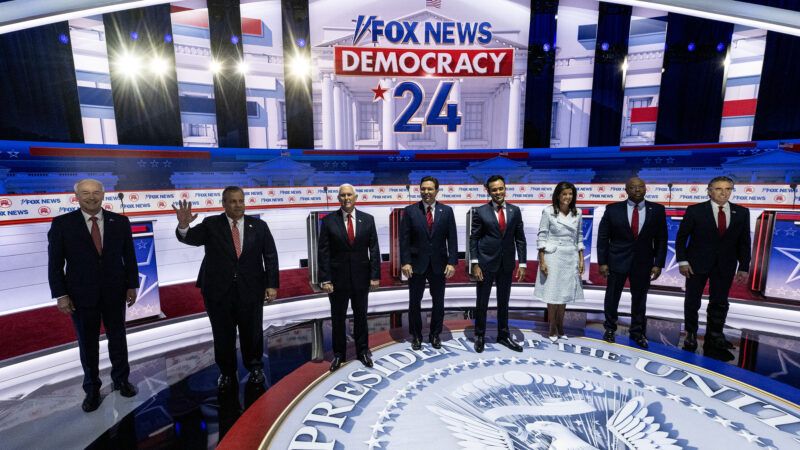There Were No Anti-Interventionist Candidates at the GOP Debate
Only Vivek Ramaswamy and Gov. Ron DeSantis said they wouldn't support additional aid to Ukraine. But both argued we should be more militarily engaged against China and Mexico.

The first 2024 Republican presidential debate made clear that there's no non-interventionist candidate in the race, even if there was a lot of quibbling over which specific foreign interventions the U.S. should prioritize.
When debate moderators asked the eight candidates on stage in Milwaukee who would not support additional military aid to Ukraine, only businessman Vivek Ramaswamy and Florida Gov. Ron DeSantis said they wouldn't.
Everyone else was enthusiastically on board with increased aid to the embattled country.
"Ukraine is the first line of defense for us," said former South Carolina Gov. Nikki Haley.
Former New Jersey Gov. Chris Christie echoed those sentiments, warning that "if we don't stand up against this type of autocratic killing in the world, we will be next."
Former Vice President Mike Pence meanwhile suggested that it was borderline anti-American to suggest there's a trade-off between devoting resources to foreign entanglements and solving domestic issues. "Anyone who thinks we can't solve the problems here in the U.S. and be the leader of the free world has a small view of the United States," he said. "If we do the giveaway to [Russian President Vladmir] Putin, it's not going to be too long before he rolls across a NATO border."
Given that baseline, the responses from DeSantis and Ramaswamy were encouragingly skeptical of increased Ukraine aid.
"Your first obligation is to defend this country and our people. I'm not going to send troops to Ukraine," said DeSantis. Likewise, Ramaswamy said that "Ukraine is not a priority" for American defense. He also took heat from Haley for past statements he'd made opposing military aid to Israel. The only war he said he wants to fight was against the administrative state.
Nevertheless, both candidates endorsed using America's resources and military might on other interventions abroad.
When asked whether he'd send "special forces" to the southern border and even into Mexico to combat drug cartels, DeSantis was unequivocal.
"Yes, and I will do it on day one. The cartels are killing tens of thousands of our fellow citizens," said the Florida governor, adding, "We reserve the right to operate" and promising to leave drug dealers on the border "stone-cold dead."
Ramaswamy similarly contextualized his opposition to Ukraine aid as a means of opposing China. He described the Russia-China alliance as the greatest geopolitical threat to American interests. By withdrawing U.S. support for Ukraine, Russia would have less need to lean on China for support in its war in that country, he argued.
Furthermore, he said that he said that the U.S. should be working with Israel to prevent Iran from gaining a nuclear weapon. Ramaswamy, like DeSantis, said that the resources we aren't using in Ukraine should be deployed to fight Mexican drug cartels.
"I think that this is disastrous that we are protecting someone else's border when we should be using those resources to stop the invasion of our southern border," he said.
No one on stage made the argument that the federal government, and the U.S. military specifically, is a poor instrument for solving our problems, foreign and domestic.
Rent Free is a weekly newsletter from Christian Britschgi on urbanism and the fight for less regulation, more housing, more property rights, and more freedom in America's cities.


Show Comments (26)